Before I start, I must make you aware that there is already a run-down of Christmas related BBC Records available from the estimable Tim Worthington
http://timworthington.blogspot.co.uk/2016/12/christmas-with-bbc-records-and-tapes.html
Tim’s book of BBC Records’ singles ‘Top of the Box‘ is essential reading and he is working on a follow-up covering of all the LPs!
However, Tim’s review was focused only on some of the singles and I wanted to have a crack at reviewing festive releases myself. There are a few winter-related LPs that I haven’t included, but I have added some general ones with Christmas content, even if they aren’t obviously Christmas themed.
And, because it’s Christmas, there’s a mix you can listen to right here with even more stocking fillers, baubles and trimmings.
I reckon that a lot of BBC Records were bought and gifted around Christmas. BBC Records’ offering of the Best of BBC TV and Radio would have been low hanging fruit to shoppers eager to grab something guaranteed to please friends and family on Christmas morning. What could be easier than a tie-in LP to their favourite kids’ show, comedy show, easy listening Radio show or some sounds of trains for the steam buff in their life? There are relatively few out-and-out Christmas cash-in records though, till the singles go a bit silly at the fag end of the label. For years, in fact, there was only a couple of releases dusted off every year and they kept the commercialisation of Christmas to things they could sell all year round. You may well have your own treasured Christmas memories, forever associated with a particular BBC record. Maybe it was your first ever record! Or perhaps you always got your dad the latest Goon Show Classics LP to add to the collection. Or you always asked for the new Sound Effects record as an easy standby for that difficult relative who couldn’t be trusted to make their own choices. A standby present that never failed you. But it probably wasn’t one of these…
Anyway, here’s Simes with a quick word about some BBC Records you might be interested in for Christmas, from 1980
Contents
- Andrew Cruickshank & The Saint Martin Singers – God Rest You Merry
- Songs are for Singing
- Characters from Dickens
- Concert Band of the Royal Corps of Signals – Winter Sport
- Members Of The Girl Guides Association – 20 Traditional Christmas Carols
- Watch
- Christmas Carols From Canterbury Cathedral
- Keith Harris & Orville – Come To My Party/Thank You For Telling Me ‘Bout Christmas
- The Pro Arte Orchestra – The Box Of Delights/The Carol Symphony
- Bryan Joan Elliott and The Elf Service – The Ballad Of Sandra Claus/The Goulash Break
- The Bryn Coch Primary School Choir Of Wales – Christmas Is Here Again/Awake Zion Awake
- Euphoria – Christmas Past And Christmas Present
Andrew Cruickshank & The Saint Martin Singers – God Rest You Merry
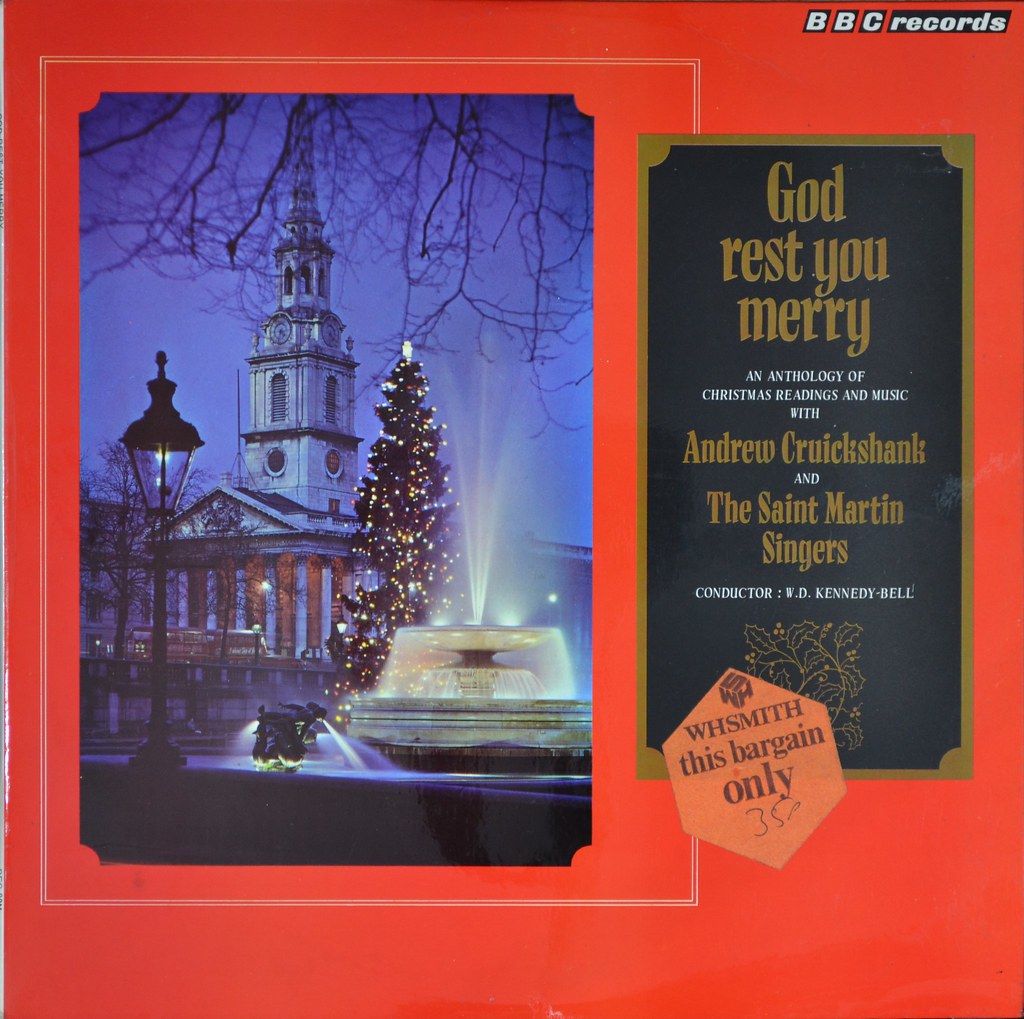
You will be blessed with being merry, by God himself! Which is pretty nice of Him and not at all censorious or pious at all, which is what you want at Christmas so, cheers! And definitely not God rest you, (or ye!) merry gentlemen. Gentleman are to be dismayed by nothing, but let’s get on with it shall I?
This LP is subtitled ‘An Anthology of Christmas Readings and Music’ and flipping over to the back we are told:
God rest you merry’, a daily programme of readings and music for Christmas week, was first broadcast in the BBC Home Service in 1961 and has been repeated in various forms over the years since then. Now, with this recording, listeners can hear again the series of programmes as a whole, including some of their favourite poems and carols.
And, indeed, again again, when this LP was re-released as REC 256 in 1976. If you’ve ever been to church or simply a British state school at Christmas you will know the territory. Nine Lessons and Carols from Kings College Cambridge is the daddy of these things, but this collection culled from radio broadcasts does the job very nicely.
God Rest Ye Merry features Andrew ‘Dr Cameron from Dr Finlay’s Casebook, Cruikshank doing the readings from 22nd – 26th December 1969.

This was part of the five-minute ‘Ten to Eight’ slot during the morning news on the Home Service, nestled between the newspapers and the weather. A time now reserved for ‘Thought for the Day’. Cruickshank had already had an LP of readings from the bible released as Ten To Eight in 1969 (REMO 43), which was advertised on the back on the REC 88 release. This included ‘The birth of Jesus (Matt 1: 1-24. Like 2: 1-7, 22, 25-35)’ which goes through the story in much the same style as above, but a bit more about Mary and Joseph’s conjugal arrangements and what Simeon had to say.
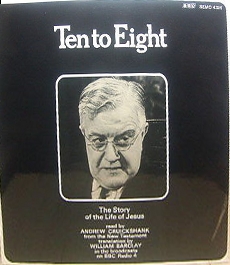
The readings were compiled by the Reverend W.D. Kennedy-Bell, who was also the long-standing conductor of The Saint Martin Singers. Before joining the BBC as the Overseas Religious Broadcasting Organiser he was a member of the clergy at St Martin in-the-fields. He is the producer of this record too – assisted by (who else?) Sylvia Cartner.
The Saint Martin Singers started as a group in 1942 with nothing much better to do whilst keeping watch for fires at the church during the blitz. They are not actually part of the church and although they are still going they rehearse at St Giles-in-the Fields nowadays. The music recording is from their first national exposure on the Home Service programme ‘Lift Up Your Hearts’ in 1961. So, it was already a classic when it was pressed up by the, relatively new, BBC Records label in 1970. They were a fixture on Lift Up… for a couple of years and then popped up all over the radio listings in the mid-sixties. However, since the mid-fifties, they had broadcast a fortnightly programme for the BBC West African Service. You won’t find that on Genome though!
At around the same time as this record, the ‘Singers had cut another disc for BBC Records’ Study label – ‘Songs Are For Singing’ RESR 18. And there are a few more Christmas songs on there too (see below).
The original God Rest You Merry release’s sleeve is rendered in a festive red and features Trafalgar Square with a view of St Martin’s. This photo was supplied by no less an authority than the, err British Tourist Authority. The design is Roy Curtis-Bramwell’s
For the reissue in 1976, Andrew Prewett is on design duties and he’s stayed with the same view and the same camera technique for the fountain, but it is a different photo. No credit is given for it, so he may have popped down there himself to get the shot.
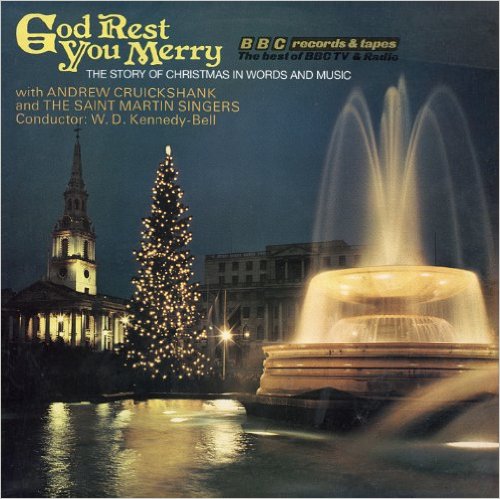
This release certainly seems to have been a perennial favourite and the Vintage Beeb CD label reissued it again in 2011. There are fifty reviews on Amazon which are overwhelmingly positive. Many speak of their nostalgia for the original broadcasts.
Overall this is as solid a piece of traditional festive BBC programming as you will get. Even for those of us who aren’t remotely religious, it has a comforting effect which is welcome at this time of year.
Songs are for Singing
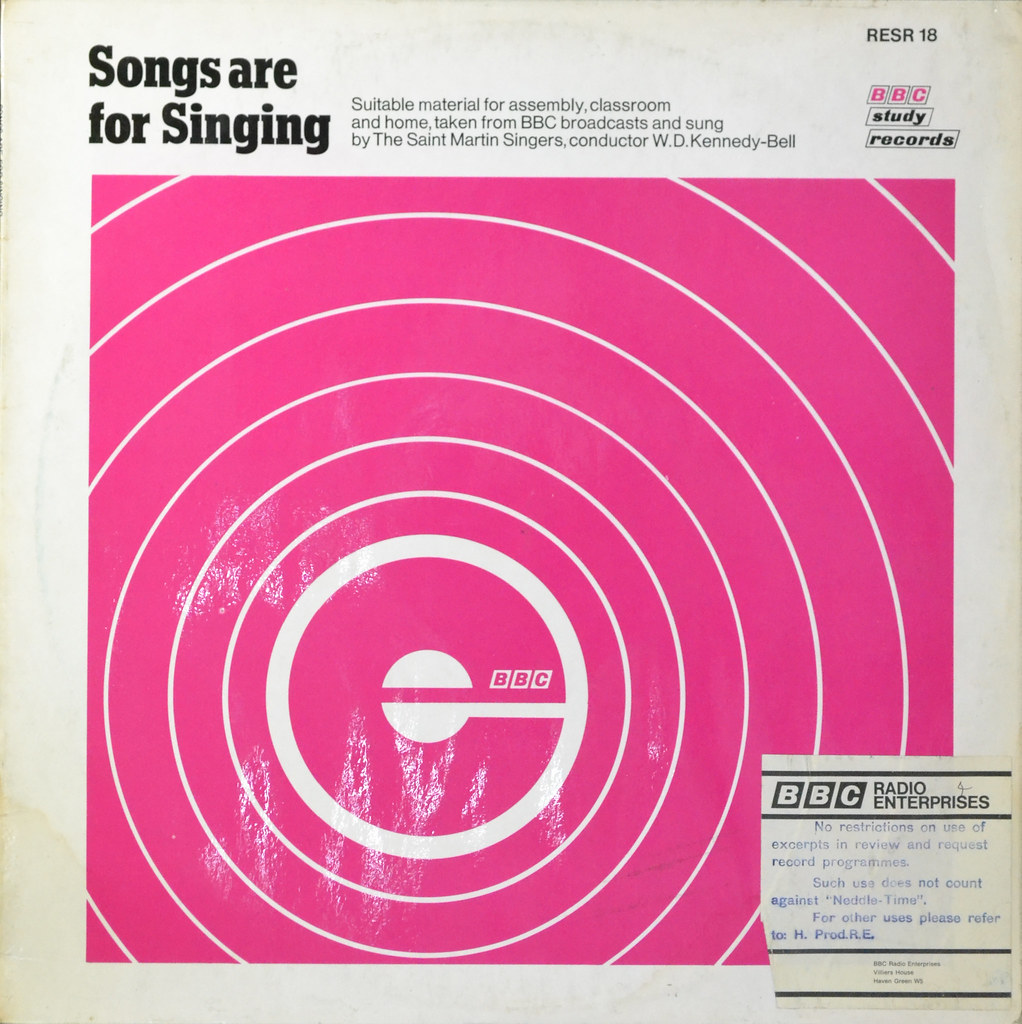
RESR 18 – 1970
Suitable material for assembly, classroom and home, selected by Jane Garland and Kay Preston and sung by The Saint Martin Singers, conductor W.D. Kennedy-Bell with percussion accompaniment by John Donaldson.
Side one is a collection of various traditional songs from around the world and side two covers the seasons with, you guessed it, some Christian festivals, including Christmas. So, we have ‘The Holly and The Ivy’, ‘Patapan’ (with conga), ‘Mary’s Child’ and ‘Cowboy Carol’ (the song, not a boy called Carol).
The singing is excellent, as you’d expect, and the percussion is minimal, but beyond that it there’s nothing much of interest here. The last band on this record is the Lord’s Prayer sung as a West Indian calypso. Cliff Richard would try a similar trick thirty years later, to mixed reviews.
Characters from Dickens

“With Patrick Magee as Scrooge”
That’s Patrick McGee, not MacNee! Although MacNee did play the young Jacob Marley in the classic 1951 film of Dicken’s A Christmas Carol. And what could be more Christmassy after a carol service than the Victorian novelist’s most famous and most adapted work? A Christmas Carol is the key text in the Victorian conception of Christmas, which lives on to this day – albeit with more high-concept TV adverts.
Patrick Magee (real name McGee) made his name as an actor with Harold Pinter and, most symbiotically, Samuel Beckett. As well as stints with Stanley Kubrick (A Clockwork Orange and Barry Lyndon) he was most prolific on film in the horror genre, but you’ll probably see him around the Christmas schedules playing the surgeon in Zulu. Sadly, he was a heavy drinker and after a turbulent time in the 70’s, with financial problems – that explains why an actor of such stature was working in low-budget horror films – he died aged 60 in 1982.

Both sides of this LP come from the Radio 4 programme ‘Story Time’. Barry Campbell put together “Twelve programmes featuring some of the less famous, but certainly not less interesting characters from Dickens.” A Christmas Carol was broadcast on 22nd December 1970.

Then it was re-issued on the main BBC Records label in 1973, but this time in stereo, with additional ‘dramatic effects’. It’s tempting to attribute these ghostly whooshes and reverberated voices to a certain BBC department at Maida Vale known for ‘special sound’, but there’s no credit given, so we’ll just have to wonder, for now… I mean, there are quite a few Christmas Carol tapes in the RWS library, but none match this production date or personnel.
Unusually, there is no sleeve design credit at all, but a large space is given over to listing all the records currently available from the other sub-label, Roundabout. Of interest only to me (and maybe Tim Worthington) is that they say that Roundabout 19 will be a follow-up to the Playschool record ‘Bang On
Concert Band of the Royal Corps of Signals – Winter Sport
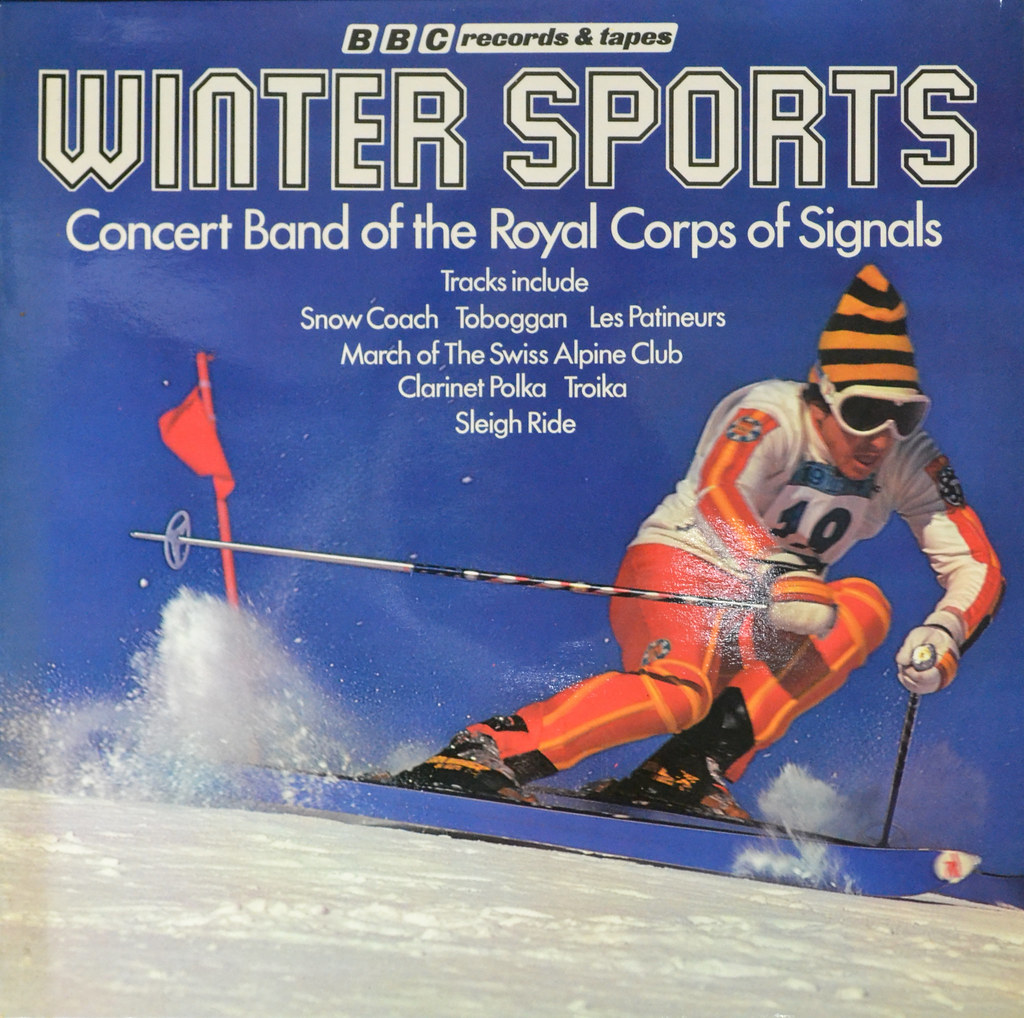
“Music of the snow resorts”
Ah, yes! The music of the snow resorts. You know! Like in the snow resorts? Well, I’m not sure either. Never been,
Well, it’s cold out here on the slopes so let’s cut to the chase. Not one involving numerous henchmen with hunting rifles and Skidoos
Thankfully there are other festive tunes on side two which kicks of with a de facto Christmas and light classical standard Sleigh Ride. This is much more like it and zips along leaving the more austere Troika in a blizzard of powder. And tucked away as the penultimate track is a treat for Tim Worthington – the top ten hit by Russ Conway ‘Snow Coach’! A more sedate but no less jolly jaunt through the winter landscape.
The rest of ‘Winter Sports’ is more redolent of Davey Bond arriving at his lodge with skis on the roof rack, or that tavern (kneipe??) in Where Eagles Dare, than Christmas. It isn’t a bad way to spend a cold evening though (especially if you’ve got a Mary Ure or Ingrid Pitt stashed out the back).
Members Of The Girl Guides Association – 20 Traditional Christmas Carols
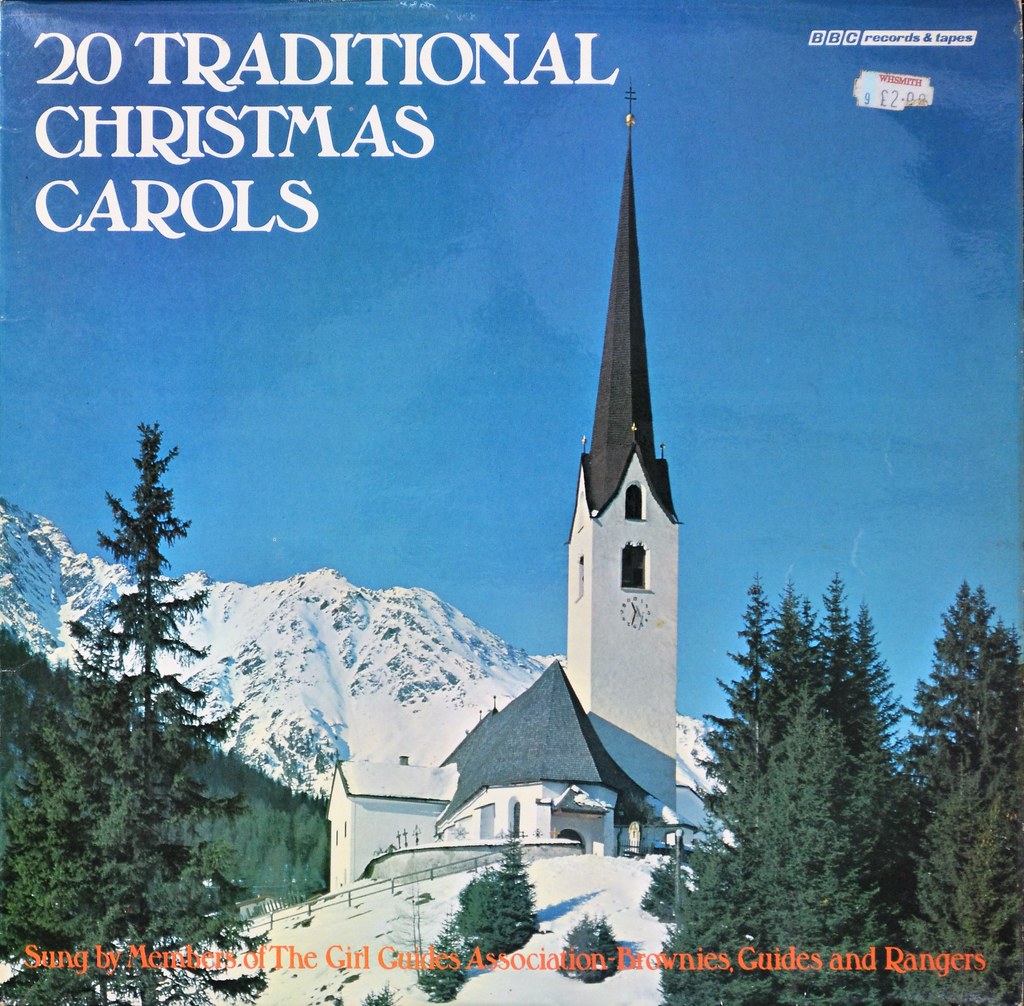
The Girl Guides were an unlikely stalwart for a record label, but BBC Records was nothing if not unusual in some of its choices. Singing along, getting together, singing for joy, highlights, festivals of song and songs for tomorrow were all LPs featuring the Guiding Association released in the 70’s – so why not a carols album? Silly not to!
There were carols on some of those other albums though. ‘Guiding Highlights’ (REC 203, 1975) has a selection tucked away at the end of side 2 and ‘Songs For Tomorrow’ (REC 389, 1980) boasts a ‘contemporary carol’.
Mario Moscardini keeps things simple on the sleeve design and whilst I’m sure he wasn’t in the pub for the rest of the day, it probably wasn’t the most taxing assignment.

The selection here is unadventurous, and even if there’s something you don’t know so well, like The Rocking Carol (not that sort of rocking!), it’s not going to surprise you with a space-funk arrangement. The selling point is the “spontaneous and unaffected performances”, it says here – not inspiring much confidence. Since first writing this I have now heard this LP and the performances are actually pretty darn good. Like the other Guide’s stuff, it is of a very high standard, vocally. Even if it’s is a bit twee and hard to enjoy for us cool kids. Especially the one by the Brownies.
Watch
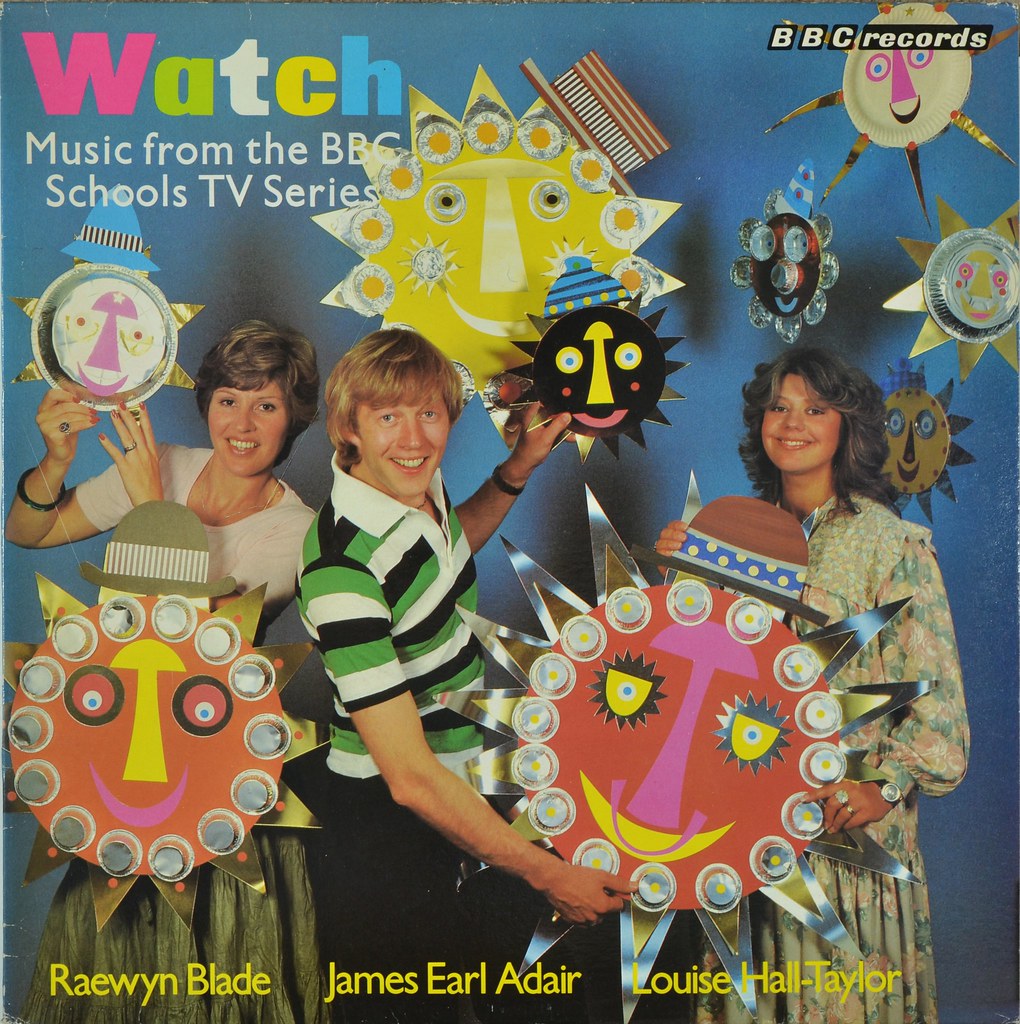
‘Fo-llow-the-staaaar fo-llow-the staaaar’
The first of three albums from the factual programme for school children, this one appears here for a significant Christmas element.
Incidentally, this is the first BBC Records LP that I was ever aware of because it was used as accompaniment (along with Felix Mendelssohn’s Fingal’s Cave) to us filing into morning assembly. In particular, track 1, side 2 ‘Dem Dry Bones’ was a firm favourite.
Your attention here though is drawn to the last band on side 1 which is given over to a festive topic. That man Worthington is way ahead of me here, so head on over to his blog for a full review of that touchstone of BBC Schools Christmas programmes, Watch – The Nativity Story. This two-part edition was first shown in 1977 and was still being used in 1982. I certainly remember it well.
As Tim noted, songs for this show were taken from a 1975 musical by the Chichester Festival Theatre called ‘Follow The Star’. On this LP we get a brief re-telling of the story by Louise Hall-Taylor, interspersed with songs sung by James Earl Adair – the familiar ‘Little Donkey’ and three numbers from the pens of Jim Parker(music) and Wally K. Daly(lyrics): ‘You Can’t Come In’, ‘Follow the Star’ and ‘Clap Your Hands and Be Cheery’. In turns: wah-wah guitar backed funk-rock head-nodder; folk-prog, proto Sir Cliff Richard Christmas hit, ear-worm; and jazz-gospel tambourines-in-the-air and out-of-your-seat school-assembly banger. Adair’s vocals are top-notch and he’s gone on to have a successful career in musical theatre.
They probably avoided ‘I’ve Always Wanted a Baby’ and the ‘We Won’t Let The Baby Die’ for some reason which we won’t go into here. Sir Tony Robinson was in the original cast and the BBC made their own version for TV in 1979 with Christopher Lillicrap and many other performers from the first production.
Christmas Carols From Canterbury Cathedral
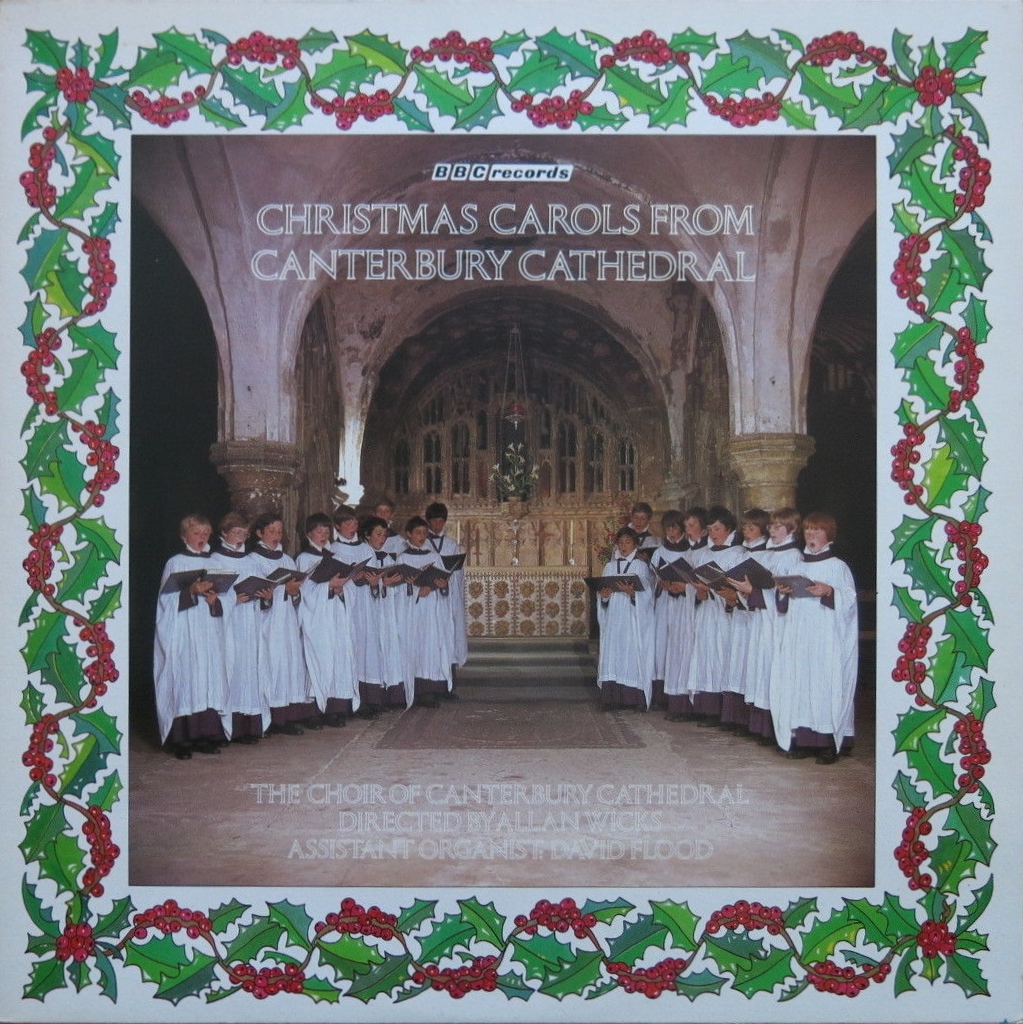
The Choir of Canterbury Cathedral Directed by Alan Wicks, Assistant Organist David Flood.
The album is not Alan Wicks’ and his choir’s first rodeo. Abbey Records put out a very similar LP in 1970 and as BBC Records and Abbey seem to have had a friendly relationship I wonder if there was a bit of a back-scratching going on.
Anyway, here we are in the new decade with a fresh take on the carol service in place of the now rather ancient ‘God Rest You Merry’. And it’s a step back into the past. There are no readings on this release – instead, the story of Christmas is told through the carols themselves. The arrangements are kept sparse, apart from the odd bit of organ and some of the old cathedral bells (captured here in 1980 just before being melted down and recast). It’s designed for you to be able to join in at home – if you are so inclined. The recordings were actually made in the cathedral, so you get the full atmosphere. Rather than a replacement for ‘God Rest You Merry’ it’s actually a more traditional approach and judging by easy availability on eBay, it must have done good business for BBC Enterprises.
I don’t have this one in my collection, so I might have a better insight next year*, if it turns up.
*Purchased and en route! 2021!
Keith Harris & Orville – Come To My Party/Thank You For Telling Me ‘Bout Christmas
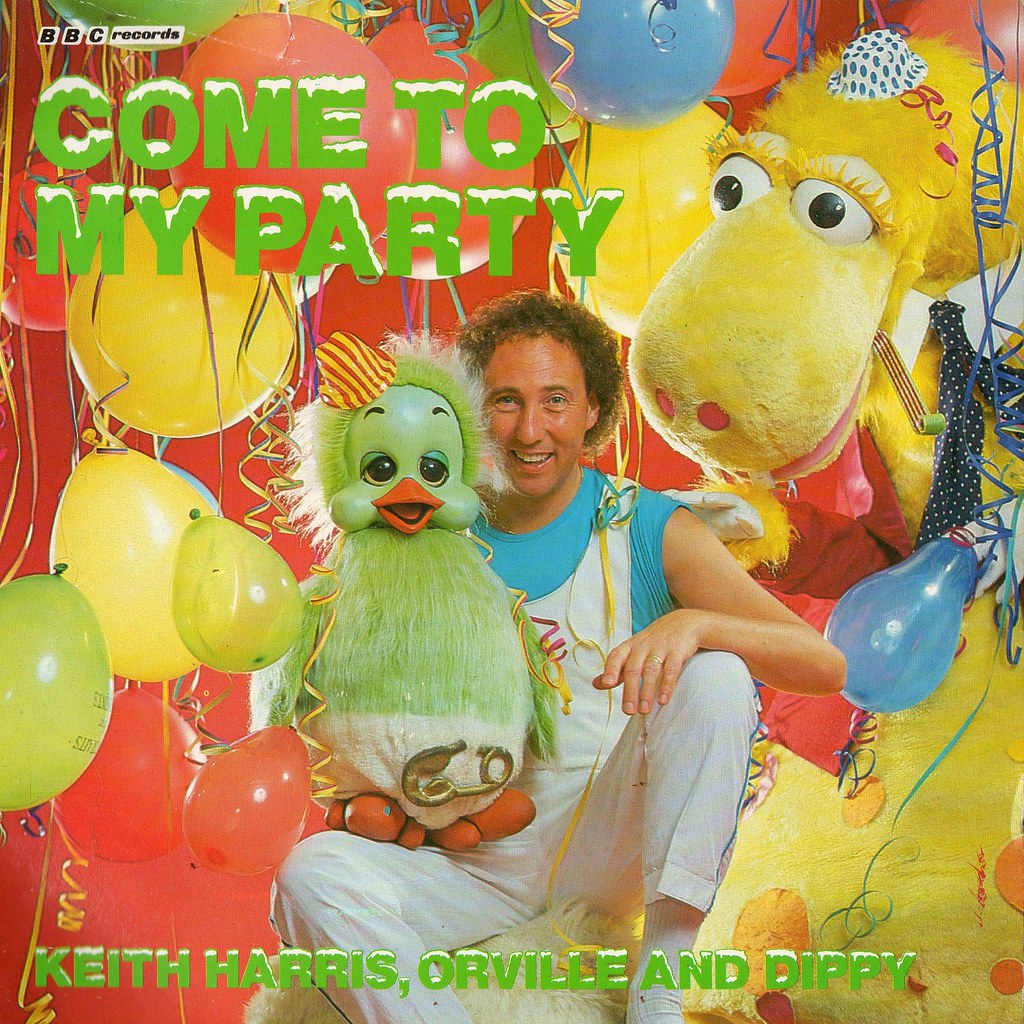
In the first revision of this post, I hurried past this record, but now I own a copy and feel duty-bound to at least give it a doing over. This was released in 1983 with hopes of emulating their top 5
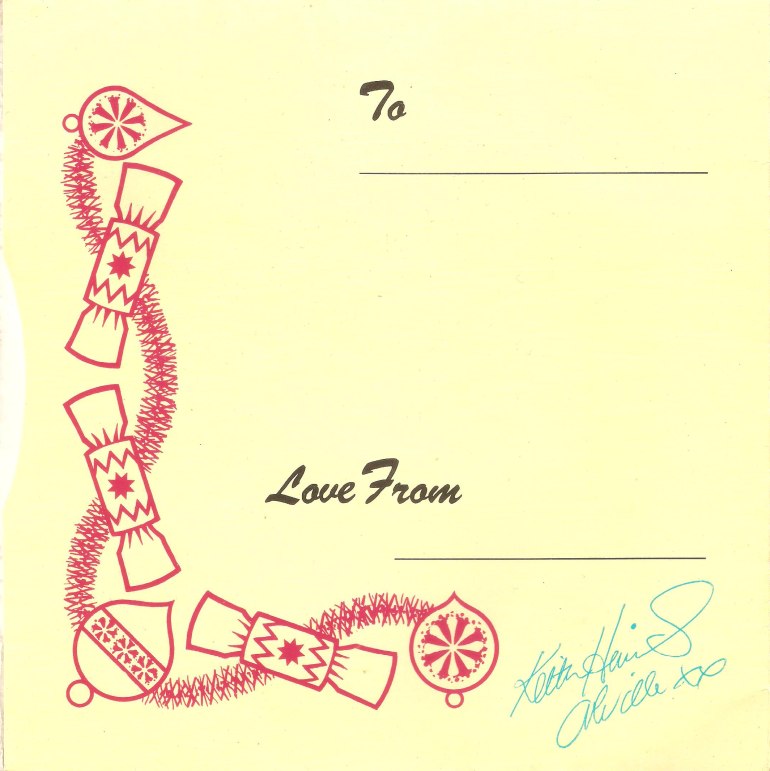
The party starts at half-past three, by the way, and Orville asks that you don’t be late. As it’s Christmas, Cuddlies ‘might’ be invited, but you’ll have to put up with both his obnoxiousness towards his fellow party-goers and, well, “ooh, he does smell”. Come to My Party was written by piano bashing, Opportunity Knocks contender, Bobby Crush. It lacks the emotional punch of his ‘Orville’s Song’ though and whilst it probably satisfied many an Orville obsessed infant its lack of lyrical substance and wit is all too evident.
On the flip-side Keith has to explain the Christmas story and who Jesus even is – “you mean you don’t know?” to his flightless companion. In a sort of ‘Whose Line Is It Anyway’ musical round, Orville then instantly sings what has just been explained to him in a Christmas ballad which Sir Cliff probably wouldn’t have turned his nose up at, to be fair. Albeit with a bit more production work. The writers were Andrew Sketchley and Nick Charles, but I can’t tell you anything for certain about them, at present. However, it was published by Irish outfit Cara Music (
The Pro Arte Orchestra – The Box Of Delights/The Carol Symphony
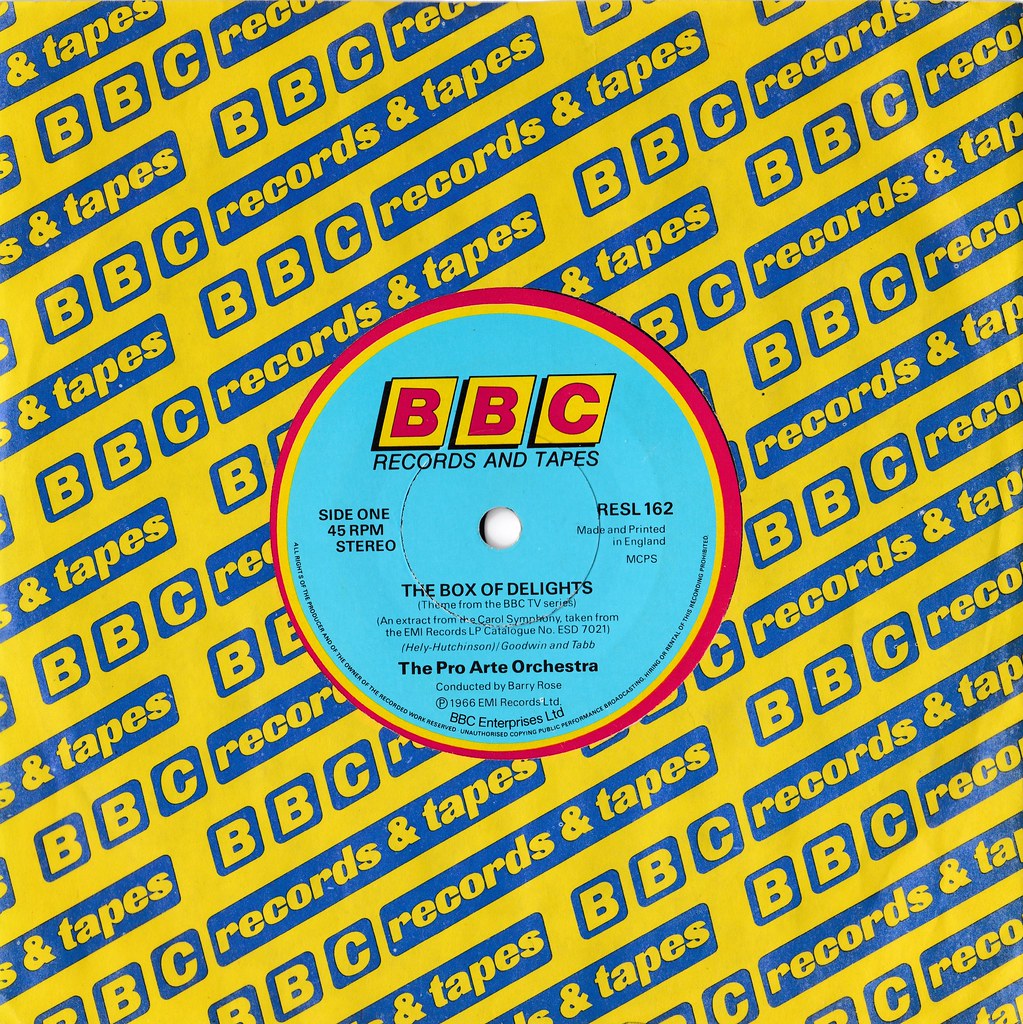
Here we are! Here’s what you’ve been waiting for!
‘The Box of Delights’ was a children’s BBC production, broadcast in the run-up to Christmas in 1984. It was more or less an instant classic. I just read the other day that the head of children’s BBC decided to retire after the finale of this was shown on the same afternoon as the Christmas edition of Blue Peter. He concluded that it could not be topped and, in my view, there really was a kind of peak, golden age, achieved at that moment. I was 9 at the time, so I am biased.
The incidental music to the drama was provided by Roger Limb of the Radiophonic Workshop, but the opening and closing titles were based on a classical work from 1927.
The opening titles start with 30 seconds that will no doubt be featured in the 1980’s instalment of ‘Scarred For Life’. The music is a plinking (pizzicato? EDIT – Harp!) music box phrase with minor-key strings putting you on edge from the off. An unsettling montage of malevolent eyes belonging to various disembodied faces – a wolf, Mr Punch, rat-man, mouse, ancient Greek warrior, antler man(?)(Hern!! Ed.), priest and finally a scruffy old chap with a twinkle in his eye – merge and swim in and out of a stormy backdrop. Patrick Troughton’s face gives way to his “box of such delights” and the music turns from creepy to comforting as the strings transform into the melody of ‘The First Noel’. Lovely! It’s still got shades of the Picture Box theme underneath, but we’re feeling Christmassy – for all of 15 seconds before it resolves with what some must have thought was early-eighties Dr Who soundtrack, as Roger limber’s up (sorry) with some synthesizers* bringing a chill back to your spine. Ace! Just a shame this isn’t on the record then really, isn’t it!?
*EDIT I had originally written “Yamaha CS80 (or is it an Elka Synthex?)” here, but I was wrong on both counts it seems. Over on the BBC Radiophonic Workshop Facebook group someone asked the question and surprising Paddy Kingsland came back with the answer from Roger himself: “The main synth in my studio was an Oberheim OBX although I might have used a DX7 occasionally. I used a sequencer to provide some of the percussion tracks. There were, of course, several conventional instruments involved which I ’treated’ from time to time including the late Mike Baines playing french horn” –
The majority of the opening and closing titles music is from Carol Symphony by Victor Hely-Hutchinson. It’s not surprising, but it’s a shame that the single cuts off the very start of the piece which sets a mood used to such great effect in the titles. Maybe it was cut for time, but as we don’t get any of the Radiophonic goodies either, well, it takes the shine off a bit.
You can’t fail to be swept along with what is there though. Not being familiar with the original – as I wasn’t, at the time – the original viewing was elevated by this music in a way that other children’s TV couldn’t match. It was extremely effective. The makers cannot take full credit for this idea though. The music had first been used by the BBC for a radio adaptation of The Box of Delights, all the way back in 1943. This recording is from 1966 and was made at Guilford Cathedral by the light-classical symphony, Pro Arte Orchestra.
The closing credits pick up somewhere through the A-side, but again we’re denied the extra special, magical, 80s nostalgia, Roger Limb ending with To The Manor Born-esque timpani flourish. Bah!
The B-side is simply titled ‘Carol Symphony’ and is another excerpt from the third movement. It’s rather dull in comparison with the main event and you wish they had put a medley of the soundtrack on there instead. It resolves nicely with the plinky refrain from the earlier section, but the preceding parts brooding romanticism just isn’t what the kids (well, most of them) wanted to hear. Double bah with an added humbug!
We don’t even get a picture sleeve! All this thwarted desire is made even more painful when you know that Mark Ayres has the original tapes ready to re-master for a full soundtrack release, if only they’d let him. Urgh! Still, we’ve got our DVDs.
Edit – I’m very happy to say that, as of December 2018, Silva Screen have released the Roger Limb soundtrack to The Box of Delights, remastered by Mark Ayres!
Bryan Joan Elliott and The Elf Service – The Ballad Of Sandra Claus/The Goulash Break
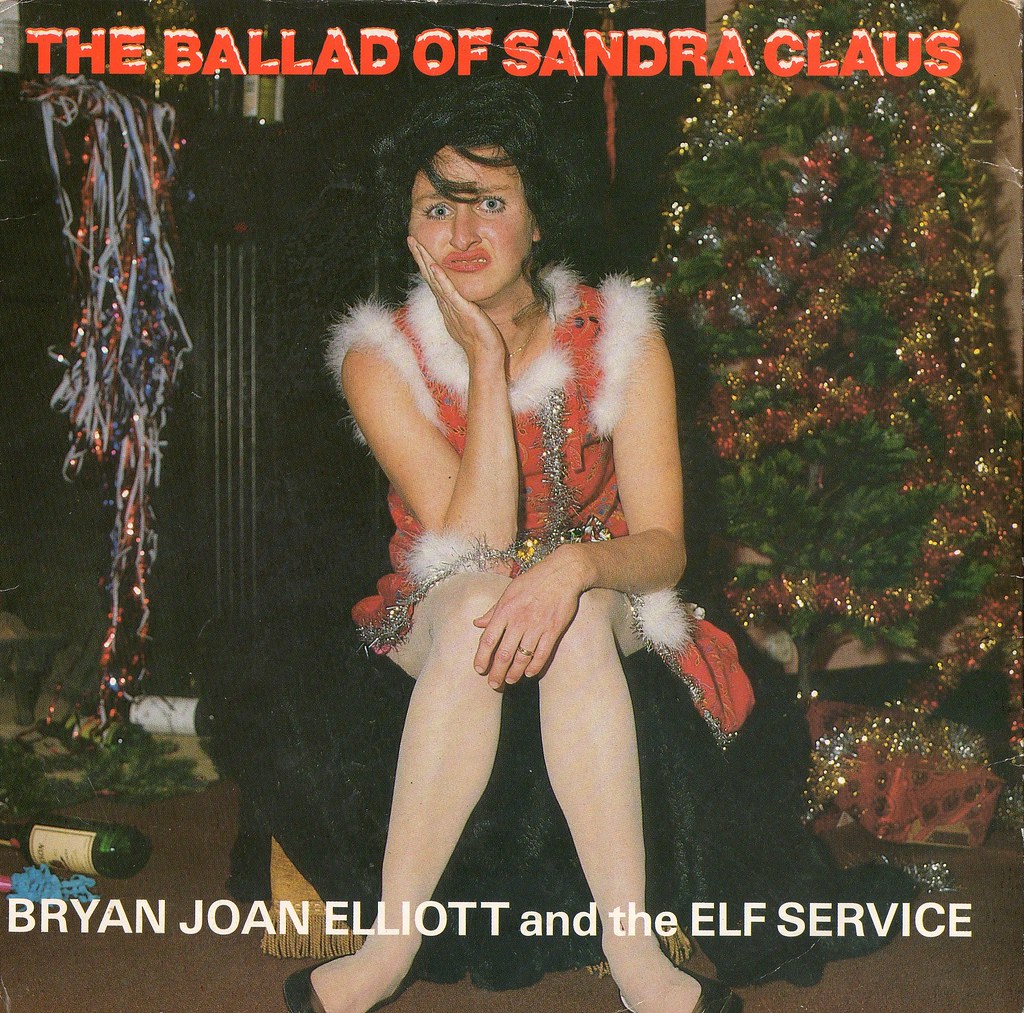
There is a promotional video!!!
This is the blurb from YouTube:
Santa Claus gets all the praise and attention this time of year but who gives a snowflake for his beautiful wife Sandra Claus. Her side of the story is told in The Ballad of Sandra Claus by Blatvian super singing star Boola Link. Already the top worldwide Blatvian Rap Artist, join Boola’s bulging fan club and make her a stonking worldwide hit outside of Blatvia.
This was uploaded in 2007 along with B-side, ‘The Goulash Break’, by a user called ‘boolalinka’. Boola Linka is then named as the star of the Goulash Break. And who else is going to have access to the promo video of both sides of this oddity? The woman responsible is Bryan Joan Elliot. The internet can only throw up the fact that she was on Punchlines in the early 80s.
…and appeared in The Rocky Horror Show in the 70s. This record cannot have just come from out of nowhere though, so she must have been up to something else, right? Well, according to Tim Worthington she had been doing the chat show rounds, so had a profile on television high enough that BBC Records decided to take a chance and put this out. Other than that, all I know today is that she was American. This probably explains the obscurity. If she went home and gave up showbiz (and the name might well have been an Equity prompted pseudonym) then that was that.
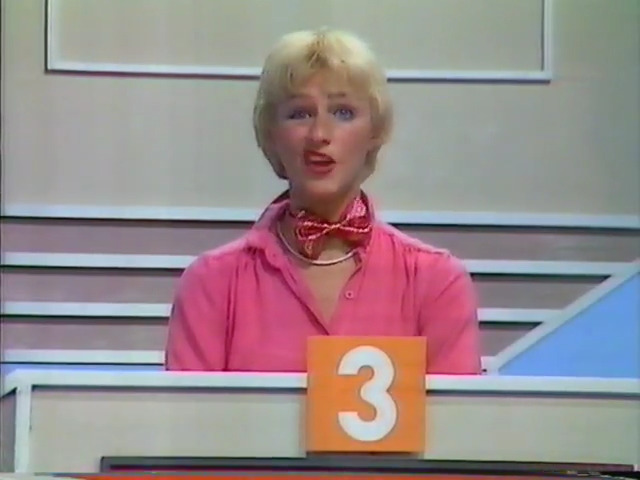
In the novelty record stakes, The Ballad of Sandra Claus was more of a ‘did not finish’ than an also-ran. Loosely based on Jingle Bells its backing is an unappealing, hackneyed, mid-80s punk-rock pastiche with a charmless drum machine rhythm used for good measure. Lacking any discernible chorus or hook of any kind, the song just about passes as a musical skit at the end of an unmemorable TV sketch show. Bryan does her best and there is at least a layer of quirkiness – Mrs Claus hails from Czechoslovakia – but this can’t make up for the general feeling of flung-together-ness. As for the feminist angle, I’m not going to even try and pretend that works, but it is a nod in the right direction, I suppose(?).
“Merry Christmas, you filthy pig”
The Bryn Coch Primary School Choir Of Wales – Christmas Is Here Again/Awake Zion Awake
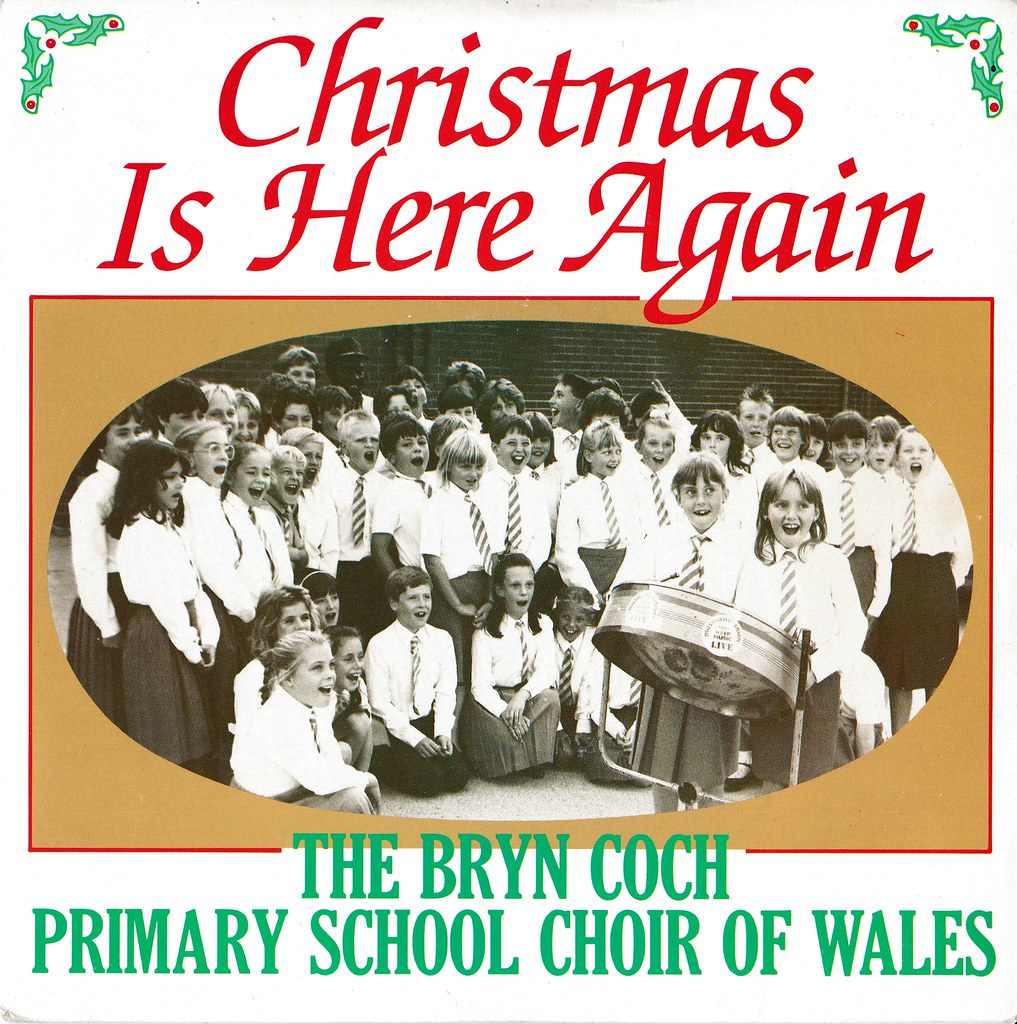
That black and white photo has more than a whiff of local newspaper, doesn’t it? I had to extract the sleeve snap above form the YouTube clip below, so any photo credit sleuthing will have to wait. To say this is rare is no understatement. Even 45Cat doesn’t have the cover photo! Apart from this site, the aforementioned 45Cat, Discogs, the enigmatic Mike’s Records and (of course!) Tim Worthington’s blog, there is just the YouTube clip to go on.
A cursory listen will tell you what you need to know: Kids. Welsh.
Update: Well, now I’ve got a copy and had a proper listen I’m revising my review to Kids. Welsh. Not bad! The result of reggae plus steel-drums plus Welsh school kids isn’t all that bad at all. In my defence, I only had the YouTube link below to go on and with all the bass rolled off (and a good part of the mids too) it lacked a certain amount of groove. The work of a certain A.Daley I haven’t been able to track down definitively, but might still be around. Recorded at Drone Studio in Chorlton, which was probably quite cheap but a lot of big names recorded demos there before getting signed. Around this time Kiss AMC recorded some of A Bit of.. (U2) there, probably just as a demo. There’s a band called The Explosion credited, but I have to assume this was a scratch studio band formed for the session,
According to Top of The Box this was a local radio hit so the ‘suddenly back after a 12-month hiatus” BBC Records decided to give this a shot at national exposure. Band Aid II were not quaking in their… let’s say hooded tops with bomber jackets/paisley shirts/braces and err, perms?
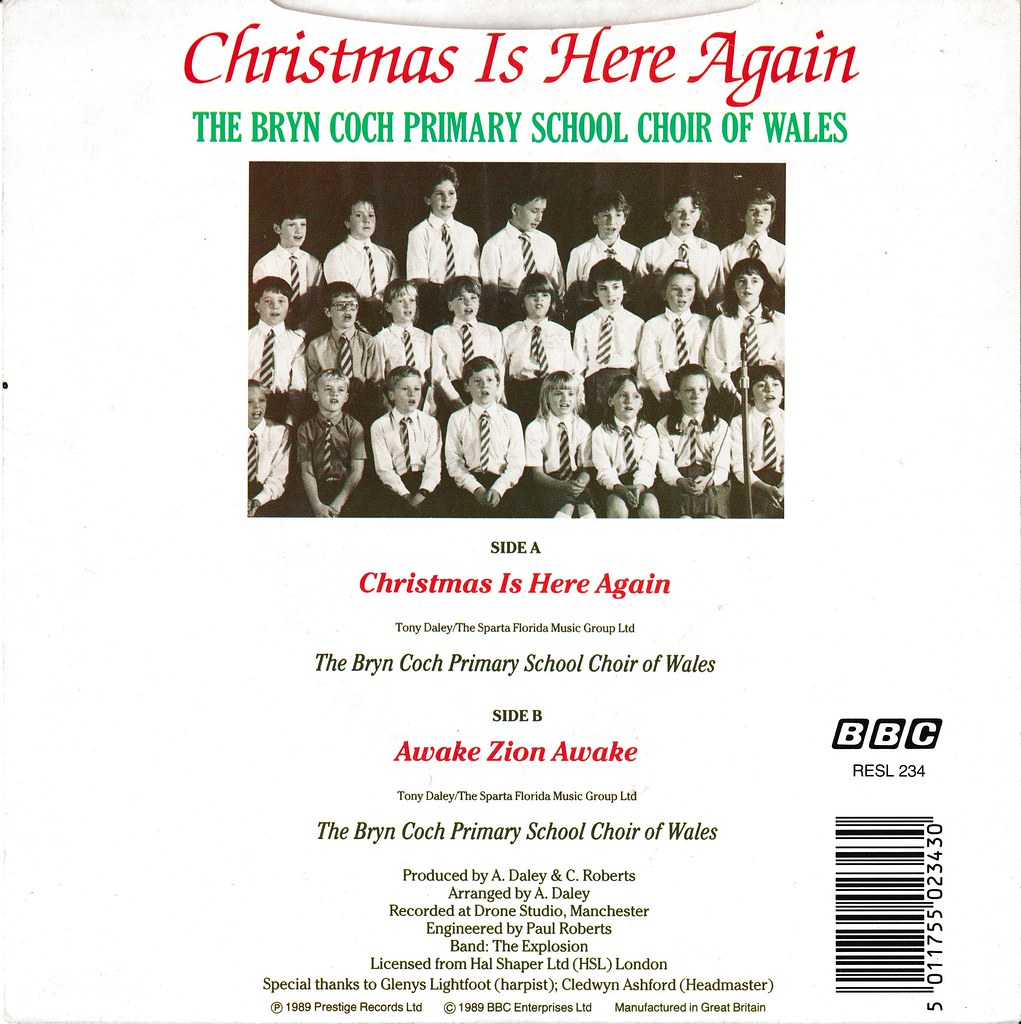
The B-side is not, we must imagine, a complete diversion into Rastafarian roots reggae, (I haven’t heard it), mores the pity. Although this is closer to what you might expect. It’s certainly a more interesting choice than what you might be anticipating from such a release.
Euphoria – Christmas Past And Christmas Present
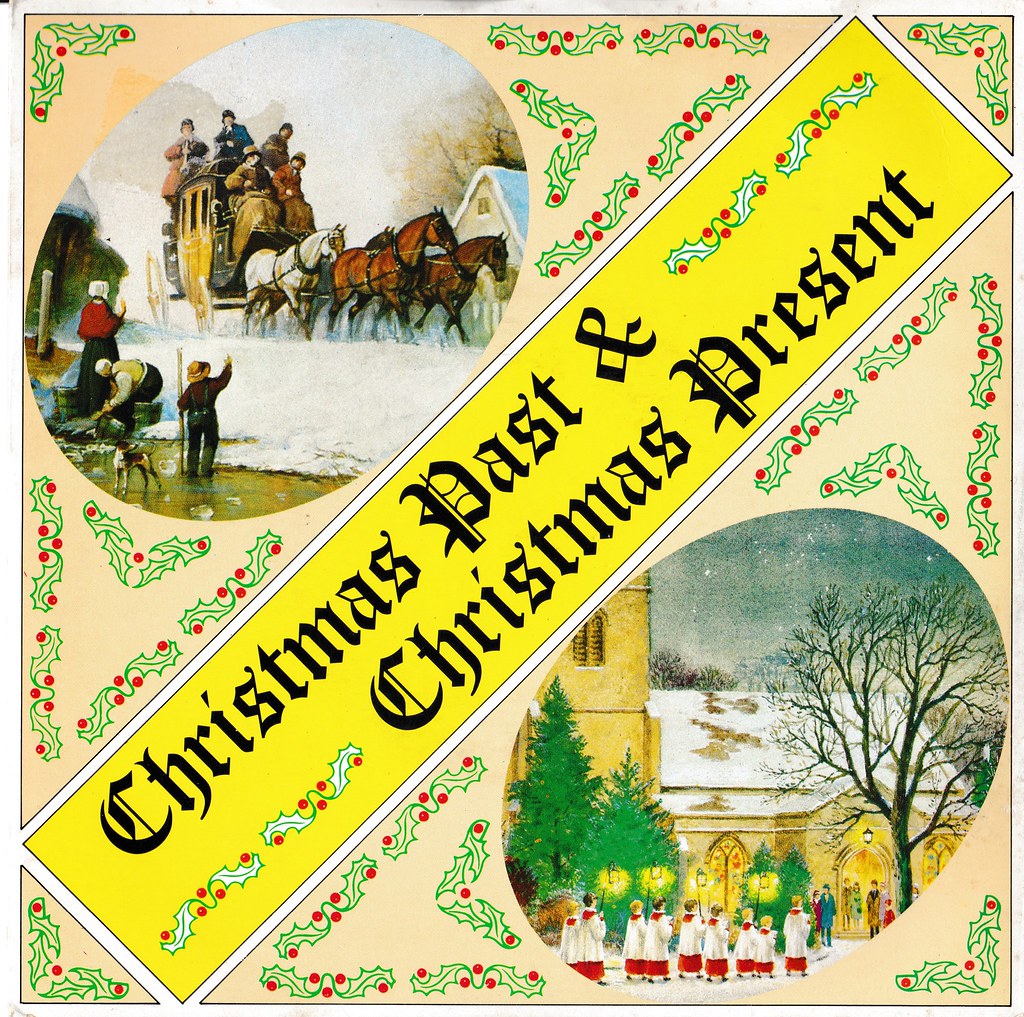
“…aaaaaaand Christmas yet to coooooome. Aw!”
The credits on this one are comprehensive, but the personnel remain obscure. Production, arrangement, writing, performing and licensing are all accounted for and we are not much the wiser.
Nick Salt and Tina Berta (now Mrs Salt, and, yes, they call themselves Salt ‘n’ Salt – really) seem to be the main performers. Some of you may remember a Central TV produced talent show on ITV in 1993 called Pot of Gold. Well, they won the first series of the Des O’Connor helmed programme and were up against the likes of Splash, Floor Technicians and Simon Cartwright (as Bob Monkhouse, natch).
Christmas Past & Christmas Present was co-written by Colin Simons and I presume that the third vocalist, Sharie-Ann Simons, is/was his wife.
The record is produced by Meliastream’s Patrick McMahon and Philip Jacobs. They are a bit shadowy but had a hand in The Saturdays #1 hit ‘What About Us’ in 2013. They seem mostly to be linked to things through Arkarna’s Ollie Jacobs. A “P. Jacobs” pops up amongst all manner of 90s dance music production credits, including Rozalla.
The rest of the credited culprits are of no great consequence and the origins of this release are lost in time, for now, but what did this cohort create? I can only imagine it’s some sort of carolling to a house music beat? Well, I couldn’t find anything online so I went ahead and bought a copy so that could tell you. Just put the needle down, and…
Hmm, synth intro and the Roland TR-909 drum machine is present and correct, so we’re in 1989 alright. The vocals are okay, I suppose, in a holiday-camp Soul kind of way. But the song isn’t up to much and I can see why this bombed. It’s hard to figure out what they are going for really. Lyrically there’s really very little exploration of the theme conjured up by the title. The chorus insists that we let every boy and every girl (from every corner of the world) ring a bell and sing a song of Christmas time. The verse mentions a birthday and sitting by a fireside remembering everyone. A guitar solo gives us all a breather from the singing, which is getting a bit much, to be honest.
So, is the Festive Fun Mix any more palatable? Actually, I often prefer the instrumental and in this case, I do enjoy it more. Not fun as such, though. Moroder style bassline is in place, fine. Hold on though. Why did they start to play jingle bells in the breakdown, give up, start again and finish after one phrase? What was that!?? “Shall we leave that in? Yeah…” There are a number of Simon May-esque strings-synth and acoustic guitar flourishes here. It could be a Holiday (RESL 181) ’89 festive special. Guitar overdubs a-plenty as we come to close, and thank god for that.
Well, I did say it was the fag-end of BBC Records. Nothing to do with the BBC at all, of course, and the epitome of ‘will this do?’ lyrically. You have to wonder what all those people were doing. It was a different time though, so let’s wish for peace on earth and have a bit of goodwill to all the men and women responsible. It didn’t make it onto my mix though. Very much the Topic bar of the selection box.
Merry Christmas!

Leave a comment